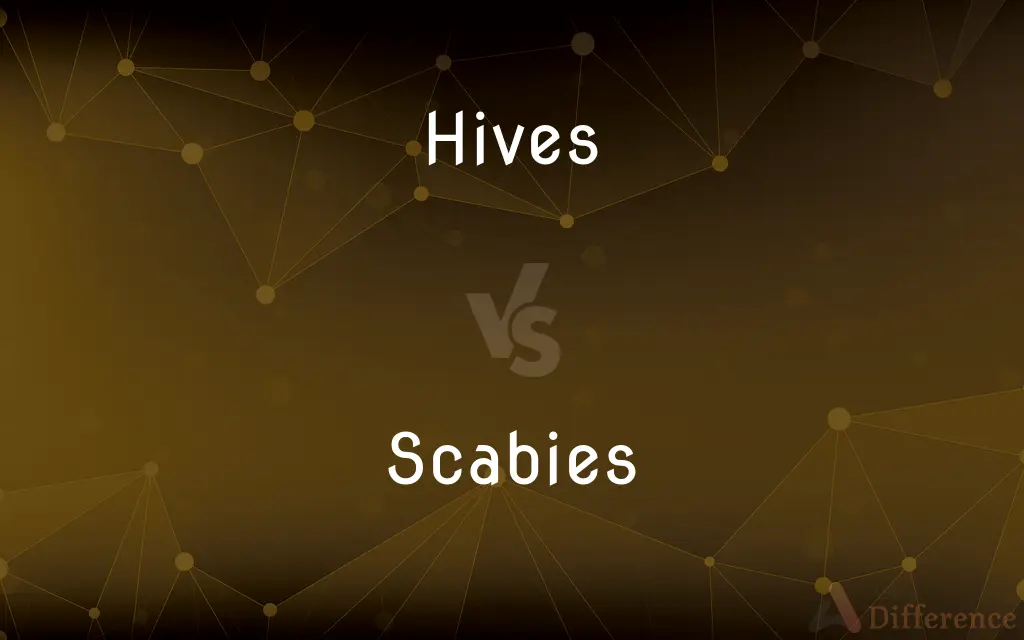Hives vs. Scabies — What's the Difference?
Edited by Tayyaba Rehman — By Fiza Rafique — Updated on September 30, 2023
Hives are red, itchy welts on the skin due to allergies. Scabies is a skin infestation caused by tiny mites, leading to intense itching. Both conditions affect the skin but have different causes and symptoms.

Difference Between Hives and Scabies
Table of Contents
ADVERTISEMENT
Key Differences
Hives and scabies, while both relating to skin conditions, originate from distinctly different sources. Hives, also known as urticaria, are raised, itchy red welts or bumps that appear on the skin. They're typically an allergic reaction to food, medicine, or another irritant. In contrast, scabies is an infestation of the skin by the Sarcoptes scabiei mite, leading to itching and rashes.
The onset and duration of hives and scabies differ substantially. Hives can appear suddenly and may last for a few hours to several days, sometimes recurring. Scabies, however, often takes weeks after initial infestation for symptoms to manifest. Once present, the itching and rash from scabies can persist unless treated.
Diagnosis and treatment for hives and scabies are distinct. Hives are diagnosed based on appearance and may be treated with antihistamines or corticosteroids. Scabies requires a microscopic examination of skin scrapings to confirm the presence of mites and is treated with prescription topical or oral medications.
In summary, hives and scabies are both skin conditions that can cause discomfort and itching. However, hives are allergic reactions, whereas scabies results from a mite infestation.
Comparison Chart
Cause
Allergic reactions to food, medicine, or other irritants
Infestation by Sarcoptes scabiei mite
ADVERTISEMENT
Appearance
Red, raised welts
Itchy rash with burrow lines
Onset & Duration
Sudden onset; hours to days
Weeks after infestation; persists until treated
Treatment
Antihistamines, corticosteroids
Topical or oral prescription medications
Transmission/Trigger
Exposure to allergens
Close personal contact, or contact with infested materials
Compare with Definitions
Hives
Raised, itchy welts on the skin due to allergens.
After eating strawberries, she developed hives on her arms.
Scabies
Contagious skin condition with intense itching.
He contracted scabies during his backpacking trip.
Hives
Skin eruptions caused by allergic reactions.
The patient's exposure to pollen resulted in widespread hives.
Scabies
Skin infestation caused by the Sarcoptes scabiei mite.
The elderly home had an outbreak of scabies last month.
Hives
Skin flare-ups causing discomfort and itchiness.
The medication caused him to break out in hives.
Scabies
Persistent itching caused by a mite infestation.
It's vital to treat all family members for scabies to prevent reinfection.
Hives
Red, itchy bumps appearing suddenly on the body.
The child got hives after using a new detergent.
Scabies
Itchy rash resulting from tiny burrowing mites.
Scabies often appears between the fingers and on the wrist.
Hives
Allergic skin response appearing as blotchy areas.
Hives covered her back after the insect bite.
Scabies
Dermatological condition spread through close contact.
Children in daycare centers can be prone to scabies.
Hives
Hives, also known as urticaria, is a kind of skin rash with red, raised, itchy bumps. They may also burn or sting.
Scabies
Scabies (also known as the seven-year itch) is a contagious skin infestation by the mite Sarcoptes scabiei. The most common symptoms are severe itchiness and a pimple-like rash.
Hives
Itchy, swollen, red areas of the skin which can appear quickly in response to an allergen or due to other conditions.
Scabies
A contagious skin disease caused by a parasitic mite (Sarcoptes scabiei) and characterized by intense itching.
Hives
Plural of hive
Scabies
A similar disease in animals, especially sheep.
Hives
The croup.
Scabies
(pathology) An infestation of parasitic mites, Sarcoptes scabiei, causing intense itching caused by the mites burrowing into the skin of humans and other animals. It is easily transmissible from human to human; secondary skin infection may occur.
Hives
An itchy skin eruption characterized by weals with pale interiors and well-defined red margins; usually the result of an allergic response to insect bites or food or drugs
Scabies
The itch.
Scabies
A contagious skin infection caused by the itch mite; characterized by persistent itching and skin irritation;
He has a bad case of the itch
Common Curiosities
How is scabies transmitted?
Scabies is primarily spread through close personal contact, but also through infested materials.
What causes hives?
Hives are often caused by allergic reactions to food, medicine, or other irritants.
Are hives contagious?
No, hives are an allergic reaction and are not contagious.
How long do scabies mites live outside the body?
Scabies mites can live outside the human body for about 48-72 hours.
Can stress cause hives?
Yes, stress can be a trigger for some individuals to develop hives.
Are the itchiness levels the same for hives and scabies?
Both can be intensely itchy, but scabies often results in more persistent itching.
How are hives diagnosed?
Hives are typically diagnosed based on appearance and medical history.
What is the primary treatment for scabies?
Scabies is treated with prescription topical or oral medications.
Can hives be chronic?
Yes, chronic hives can last for more than six weeks and may recur over months or years.
How soon after exposure do scabies symptoms appear?
It can take up to 4-6 weeks for symptoms to appear after initial exposure.
Is there a vaccine against scabies?
No, there is no vaccine for scabies.
Can scabies be prevented?
Regular hygiene and avoiding close contact with infected individuals can reduce the risk.
Can pets get scabies?
Pets can get a type of mite infestation similar to scabies called "mange."
Can you get hives from heat?
Yes, some people can develop hives from exposure to high temperatures, called heat urticaria.
What should I do if I suspect I have hives?
Consult a doctor or allergist to determine the cause and get appropriate treatment.
Share Your Discovery

Previous Comparison
Consultancy vs. Advice
Next Comparison
State vs. ProvinceAuthor Spotlight
Written by
Fiza RafiqueFiza Rafique is a skilled content writer at AskDifference.com, where she meticulously refines and enhances written pieces. Drawing from her vast editorial expertise, Fiza ensures clarity, accuracy, and precision in every article. Passionate about language, she continually seeks to elevate the quality of content for readers worldwide.
Edited by
Tayyaba RehmanTayyaba Rehman is a distinguished writer, currently serving as a primary contributor to askdifference.com. As a researcher in semantics and etymology, Tayyaba's passion for the complexity of languages and their distinctions has found a perfect home on the platform. Tayyaba delves into the intricacies of language, distinguishing between commonly confused words and phrases, thereby providing clarity for readers worldwide.














































